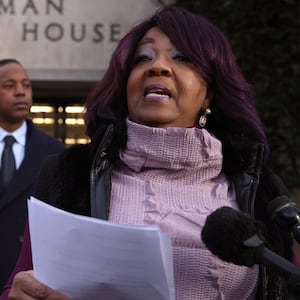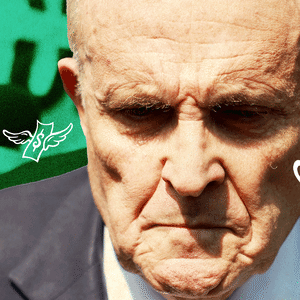By filing for Chapter 11 bankruptcy on Thursday, Rudy Giuliani triggered a stay on a federal judge’s order to begin immediately paying $148 million in damages that a jury awarded the two election workers he shamelessly defamed.
“It’s automatic,” said Ishaq Kundawala, an associate dean and bankruptcy expert at Mercer University Law School. “And it prevents creditor collection.”
But Kundawala noted that bankruptcy provisions would only apply to the debts arising from compensatory damages, in this instance, $16.2 million for Ruby Freeman and an equal amount for her daughter, Shaye Moss.
Giuliani would still owe $20 million to each of them for inflicting emotional suffering, along with a total of $75 million in punitive damages for the two.
The only way Giuliani could escape the full brunt of those debts would be to convince a bankruptcy judge that his baseless vilification of the election workers was not what the law terms “willful and malicious.”
But willful and malicious is how Giuliani has always been when things do not go his way.
Long before he filed for Chapter 11, Giuliani demonstrated a moral bankruptcy that was too often ignored by those who saw him as America’s Mayor.
Yes, he rose to the occasion after 9/11. But on his way to becoming mayor, he joined a mob of off-duty cops outside City Hall as they shouted racial slurs about the Black incumbent, David Dinkins. He sought to shut down an art exhibit at the Brooklyn Museum because he was incensed by a Black artist’s depiction of the Virgin Mary.
And he essentially just shrugged when the police killed a series of unarmed Black men. One of them was a 26-year-old security guard named Patrick Dorismond who took offense when an undercover cop approached him for drugs in the spring of 2000. The resulting argument ended with the cop killing him.
“He was no altar boy,” Giuliani said at the time, adding that Dorismond had a criminal record.
In fact, Dorismond had been an altar boy at a Brooklyn church. His only previous run-in with the law involved a quarter he borrowed when he was 13.
Giuliani was similarly quick to judge in numerous instances. He remained so in November of 2020, when he saw an Election Day video of Freeman and Moss in the State Farm Arena in Atlanta after the closing of the polls. Freeman at one point handed something to Moss.
“Quite obviously, surreptitiously passing around USB ports as if they're vials of heroin or cocaine,” Giuliani observed in an online posting. “I mean, it's outstanding. It's obvious to anyone who's a criminal investigator or prosecutor. They're engaged in surreptitiously illegal activity.”
In fact, Freeman was handing her daughter a ginger mint. Giuliani nonetheless continued to insist the two were part of an effort to steal the 2020 election. He persisted in the lie on Friday in a live TV interview after the jury made what it deemed a just award. Freeman and Moss’s lawyer reached out to Giuliani and asked him to desist.
“Giuliani refused,” court papers note.
Freeman and Moss responded on Monday with a second lawsuit, this one seeking to stop the continuing defamation.
“Giuliani’s statements, coupled with his refusal to agree to refrain from continuing to make such statements, make clear that he intends to persist in his campaign of targeted defamation and harassment.” the new suit says. “It must stop.”
The suit seeks an injunction barring Giuliani “from continuing to repeat the very falsehoods about Plaintiffs that have already been found and held, conclusively, to be defamatory.”
On Wednesday, Judge Beryl Howell noted Giuliani’s history of hiding his assets and ordered him to begin paying the judgment immediately. The one immediate way for Giuliani to delay that was to file for bankruptcy.
“The filing should be a surprise to no one,” Giuliani adviser Ted Goodman, said in a statement. “No person could have reasonably believed that Mayor Rudy Giuliani would be able to pay such a high punitive amount.”
The statement continued, “Chapter 11 will afford Mayor Giuliani the opportunity and time to pursue an appeal, while providing transparency for his finances under the supervision of the bankruptcy court, to ensure all creditors are treated equally and fairly throughout the process.”
The idea that Giuliani has demonstrated any interest in being equal and fair to Freeman and Moss is a joke. But Goodman is right about one thing: Bankruptcy will in fact require Giuliani to detail his finances.
“If nothing else, he'll have to be fully transparent about his financial disclosures,” Kundawala said. “If he hasn't already, he'll need to do that right away. Otherwise, he's at risk for having his bankruptcy case dismissed and then he is back to square one.”
Even if the financial bankruptcy case goes ahead, it will likely cover only a fraction of what Giuliani owes Freeman and Moss. He will remain fully responsible for the rest, which results from the moral bankruptcy that has often led him to be in the wrong and to stay there.







